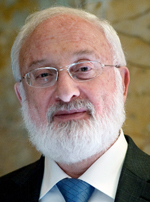
PETACH TIKVAH, Israel — The human impact of the recent massive explosion in a port warehouse district in Beirut cannot leave anyone indifferent. It has left a gaping wound among the already maimed Lebanese population, which has suffered a prolonged existential economic crisis. The international community is questioning how the aggravated crisis in Lebanon will affect a region as volatile as the Middle East. The answer will depend entirely on Israel, on its ability to deliver what the world expects from it: to become the light to the nations and radiate that light to the region and the entire world.
Some analysts consider the deadly explosion beneficial to Israel since the terrorist group Hezbollah—to whom Lebanese protesters point as the prime suspect in the blast—could be forced to enter a period of restraint. I do not agree. I do not think a disaster harming the citizens in one country can possibly benefit another country. Therefore, this human catastrophe will not influence the Middle East for the better or for the worse.
Israel offered humanitarian aid and support to the disaster-stricken country, and Lebanon’s flag was displayed on Tel Aviv’s City Hall, but both gestures were perceived by many as mockery. We need to express sympathy, but not forcefully and persistently reach out. We can learn from our attempts to build a close alliance with our neighboring countries Egypt and Jordan: Despite our efforts to get closer and invest in cooperative projects, relations remain cold.
Israel, in fact, can provide the invaluable assistance that Lebanon (and the entire world) needs, as it holds the key to a better future. But we first need to understand precisely what the nations truly demand from us to carry out.
Throughout history up to current times, the Jewish people have presented the nations with remarkable accomplishments in scientific and academic skills, in life-saving inventions and breakthrough discoveries. But while developing all those, we overlooked the one tenet that the world needs most today and which is altogether absent on our entire planet: unity. This does not refer to the kind of unity necessary for defeating an adversary. Rather, it is the kind of connection that can provide an example to be shared with whoever has interest in embracing it.
As foremost Kabbalist Rav Yehuda Ashlag wrote,
“It is upon the Israeli nation to qualify itself and all the people of the world … to develop until they take upon themselves that sublime work of the love of others, which is the ladder to the purpose of Creation.” (The Arvut, Mutual Guarantee)
By engaging in this mutual venture to build a new, positive society based on love and connection above differences, Israel will be able to make giant strides toward realizing the destiny that our forefathers dreamed of: to be “light unto the nations.” As a result, the world will happily absorb the spirit that we will spread, and the animosity toward Israel will disappear.
As Rav Kook elaborated about the role of the Jewish nation to a global positive change,
“The construction of the world, which is currently crumpled by the dreadful storms of a blood-filled sword requires the construction of the Israeli nation … in anticipation of a force full of unity … that is found in Israel.” (Orot [Lights])
Indeed, if the nations of the world want to find peace, the only thing that they need to do is invert their hostility toward Israel into pressure upon this nation to unite, which will open the pipe to tranquility and security in the world. At that time, Israel will be a beacon of hope for all the nations to live in peace, brotherhood, and unity with our neighbors and the entire world.
*
Michael Laitman, Ph.D., studied philosophy and Kabbalah at the Russian Academy of Sciences in Moscow, and now resides in Petach Tikvah, Israel. He has published more than 40 books on a variety of topics.